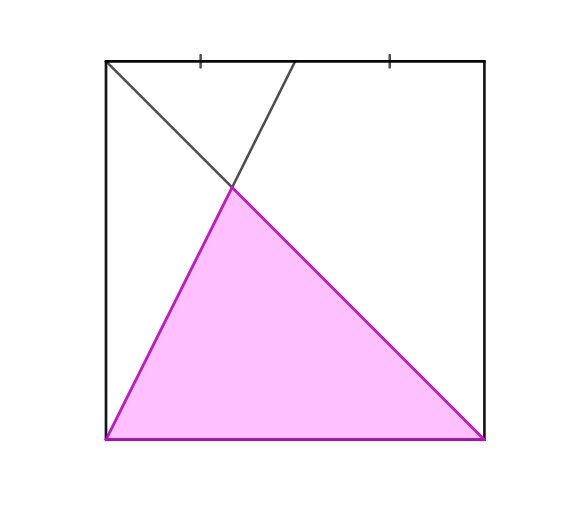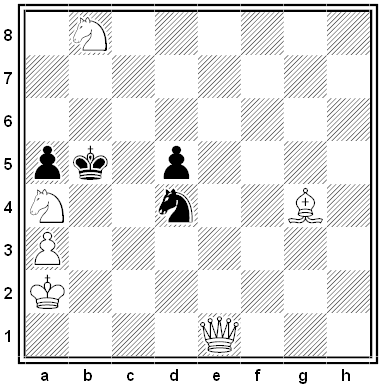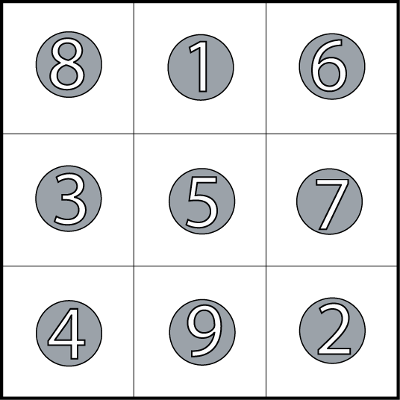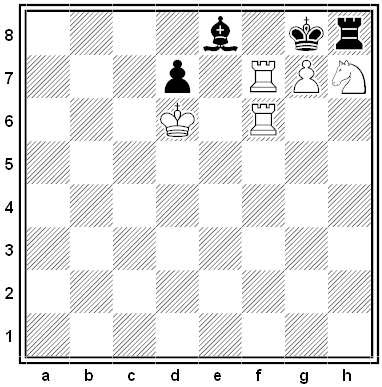
I think this appeared originally in Ed Southall’s Twitter feed. What fraction of the square is shaded?

I think this appeared originally in Ed Southall’s Twitter feed. What fraction of the square is shaded?
In 2006 Martin Gardner asked: Can you arrange the 16 non-pawn pieces in a standard chess set on a 5 × 5 board so that no piece attacks a piece of the opposite color? As in a conventional game, the two bishops of each color must stand on squares of opposite colors.
A puzzle from the 1997 Ukrainian Mathematical Olympiad:
Cells of some rectangular board are coloured as chessboard cells. In each cell an integer is written. It is known that the sum of the numbers in each row is even and the sum of numbers in each column is even. Prove that the sum of all numbers in the black cells is even.

By K. Makovsky. White to mate in two moves.
In The Two-Move Chess Problem (1890), Benjamin Glover Laws calls the first move here “ideal” and “splendid.” “[I]t is not always a composer’s good fortune to strike a vein which is susceptible of such an excellent opening move as is illustrated in this problem.” What is it?
This verse is known as “Lord Macaulay’s Last Riddle.” Lord Macaulay was Thomas Babington Macaulay (1800-1859), though his authorship of the riddle is uncertain. What’s the answer?
Let us look at it quite closely,
‘Tis a very ugly word,
And one that makes one shudder
Whenever it is heard.
It mayn’t be very wicked;
It must be always bad,
And speaks of sin and suffering
Enough to make one mad.
They say it is a compound word,
And that is very true;
And then they decompose it,
Which, of course, they’re free to do.
If, of the dozen letters
We take off the first three,
We have the nine remaining
As sad as they can be;
For, though it seems to make it less,
In fact it makes it more,
For it takes the brute creation in,
Which was left out before.
Let’s see if we can mend it —
It’s possible we may,
If only we divide it
In some new-fashioned way.
Instead of three and nine, then,
Let’s make it four and eight;
You’ll say it makes no difference,
At least not very great;
But only see the consequence!
That’s all that need be done
To change this mass of sadness
To unmitigated fun.
It clears off swords and pistols
Revolvers, bowie-knives,
And all the horrid weapons
By which men lose their lives;
It wakens holier voices —
And now joyfully is heard
The native sound of gladness
Compressed into one word!
Yes! Four and eight, my friends!
Let that be yours and mine,
Though all the hosts of demons
Rejoice in three and nine.
Above: From Paris, 1927: a novelty car that can “sidle” into parking spaces.
Below: Someone was actually working on this in the 1950s (thanks, Martin):
A related puzzle from The Chicken From Minsk, Yuri B. Chernyak’s 1995 collection of math and physics problems: Why is it easier to parallel-park a (conventional) car by backing into the space rather than pulling in directly?
James Mayfield gives this clever expression in the August 2006 issue of Word Ways:
BEAR + RARE + ERE = RHYME
It’s an alphametic: If each letter is taken to represent a different digit, it encodes a valid equation. What’s the equation?
Is it possible to divide a circle into n parts of equal area using only a straightedge and compasses?

Lee Sallows sent this clever puzzle, a followup to one we presented in 2010:
In the square shown above, any 3 counters in a straight line sum to 15.
Puzzle: Reposition the counters (again, one to each cell) to produce a new square again showing eight collinear triplets summing to 15, but with 1 now placed in a corner square.

A densely imaginative little problem by Joseph C.J. Wainwright. White to mate in two moves.